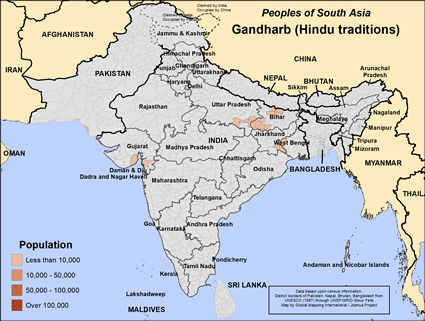The Gandharb people, also known as the Gardharv, are a Jat community. They are an ancient people mentioned in the Vedas. In these sacred Hindu writings, they were known as singers, musicians and dancers who lived near temples. The British called the Gandharb a "martial" (military) caste. The Gandharb men fought with and against the British during the colonial period. The Gandharb often led rebellions against the Muslim rulers during the Mughals' reign. For their military services, the Gandharb were given tracts of land for farming. Unfortunately many of the Gandharb are landless agricultural laborers at the present time. The Gandharb still perform at Hindu festivals but is not a source of income.
The main languages of the Gandharb are Bhojpuri and Hindi. Many Christian resources are available in both languages including a complete Bible and JESUS Film.
They live in the Indian states of Bihar and Jharkhand, Uttar Pradesh, West Bengal, Jharkhand and Gujarat. Most live in rural villages.
The primary occupation of the Gandharb today is agriculture and military service. Many of the young men join the Indian Army and send money to their families. The lifestyle or the Gandharb varies depending on their ownership of land. Some Gandharb possess land, which they use for farming. Other non-landowning, uneducated Gandharb live at the poverty level. The landowners tend to more educated and middle class. The landless Gandharb live at the subsistence level.
Each Gandharb marries outside of their seven clans or gotras but within the larger group. Families arrange marriages. The newly married couple lives near or with the groom's parents. Sons inherit property with the eldest son becoming head of the family upon his father's death. A caste council promotes the group's interests and settles legal disputes.
The Gandharb grow wheat, lentils, millet, cotton, corn and vegetables. They also keep animals such as chickens, goats and water buffaloes for their family's use.
The Gandharb people practice Hinduism, the ancient religion of India. They worship and serve the gods of the Hindu pantheon. Hindus believe that by performing rituals and good works that they will attain moksha or freedom from the endless cycle of birth, death and rebirth. They visit Hindu temples and offer prayers, food, flowers, and incense to their gods in hopes of gaining protection and benefits. They do not have a personal or familial relationship with their gods like Christians or Jews. There are many forms of Hinduism, each with its own deities and beliefs.
The main yearly holidays of the Gandharb people are Holi, the festival of colors and the start of spring / Diwali, the festival of lights / Navratri, the celebration of autumn / and Rama Navami, Rama's birthday.
The landless portion of the Gandharb population need help in learning new job skills and in educating their children. These Gandharb also often lack access to clean water and modern medicine. Most of all, the Gandharb need to hear and understand the message of Jesus Christ. He alone can make them right with the one true God and forgive their sins.
Pray for gospel workers to catch a vision for reaching the Gandharb people for Jesus and that in God's sovereign timing their hearts would be open and ready to follow Him.
Pray for Jesus movements to bless extended Gandharb families so the gospel will spread rapidly among this people group.
Pray for the spiritual lives of the Gandharb people to become fruitful as they follow Christ.
Pray for the lives and culture of the Gandharb people to evidence the rule and reign of the Kingdom of God as they open to the gospel, and for the beauty of Jesus to be seen in them.
Scripture Prayers for the Gandharb (Hindu traditions) in India.
https://en.wikipedia.org/wiki/Gandharv
https://www.jatland.com/home/Gandharva
http://www.indiachildnames.com/name.aspx?name=Gandharva
| Profile Source: Keith Carey |











